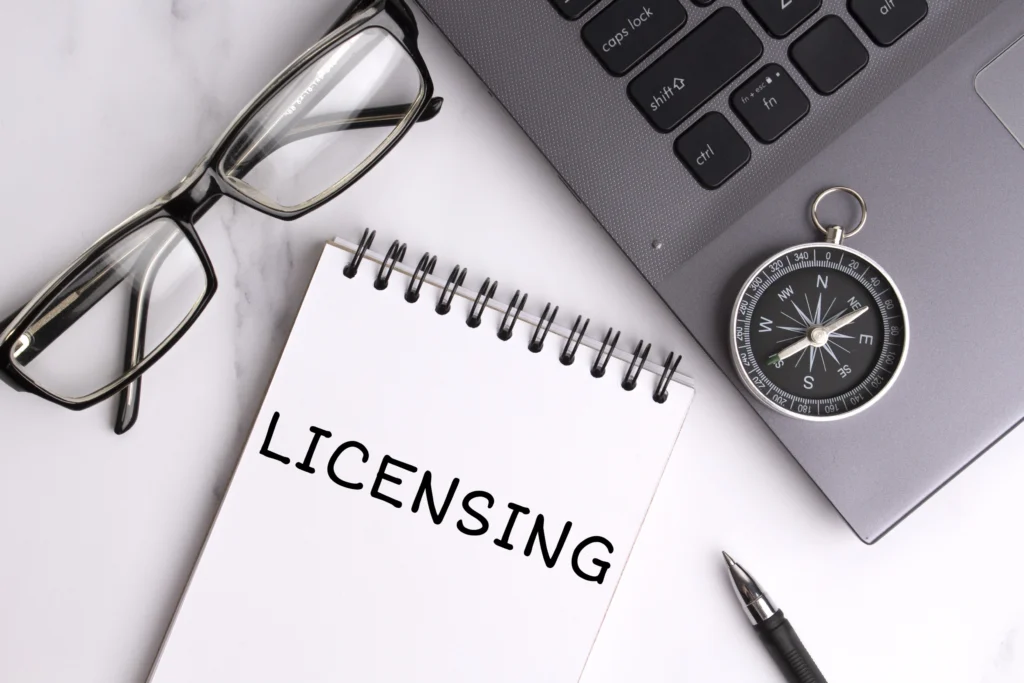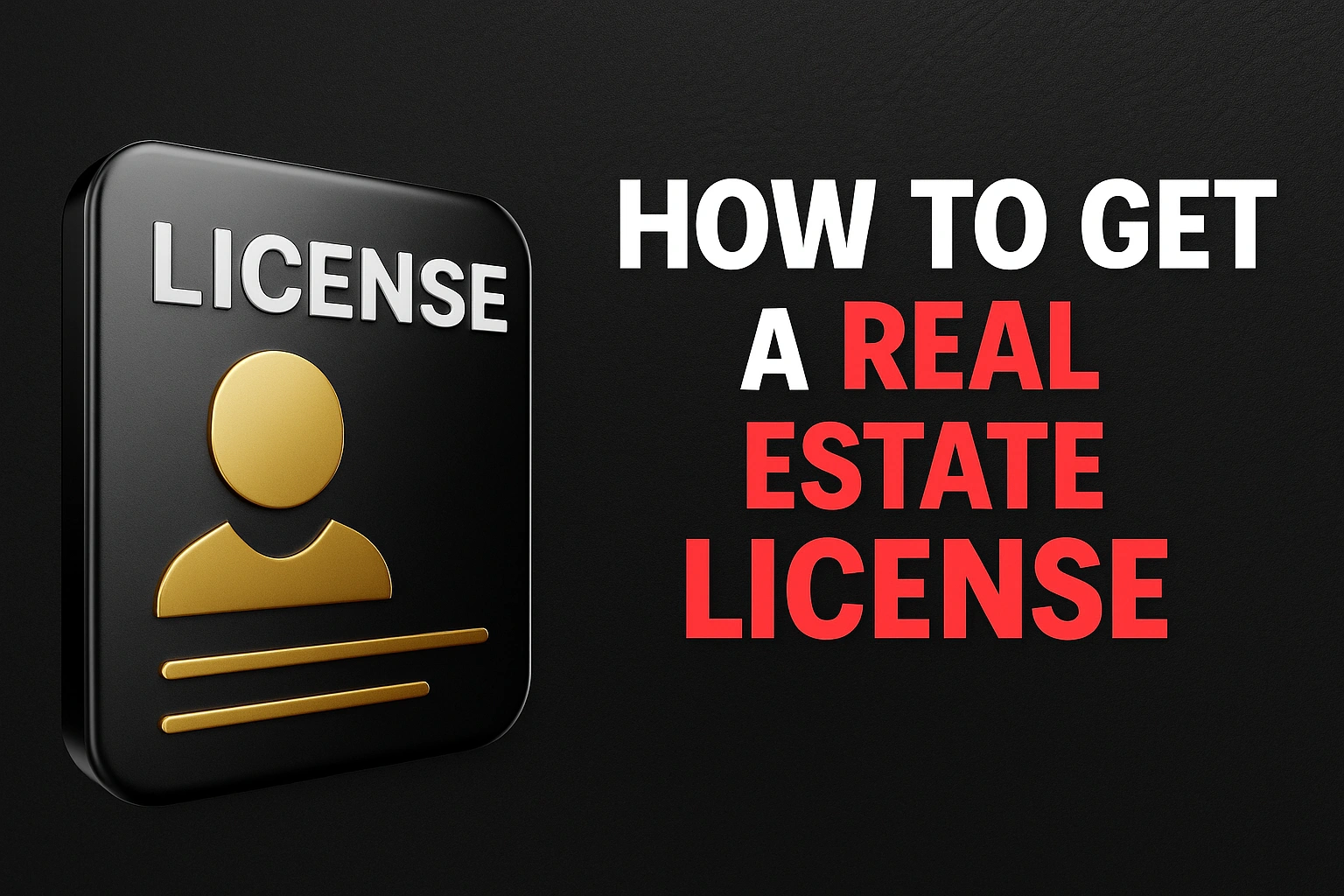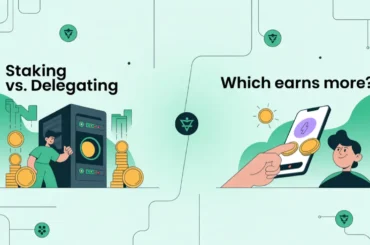Introduction
Are you looking for a job where you can help people find their dream home, have flexible hours, and make a lot of money? Getting your real estate license could be the best thing for you. In this job, you help people make one of the most important decisions in their lives: whether to buy or sell a house. To get a real estate license, you have to meet certain requirements, take a course, pass an exam, fill out an application, and join a real estate company. The steps vary by state. This guide will go over each step in detail, talk about possible costs and time commitments, and give you useful tips. This article will help you understand how to become a real estate agent if you’re changing careers or just starting out in the job market.
What Is a Real Estate License and Why Do You Need It?

Definition of a Real Estate License
A real estate license is a certificate given by the state that allows you to help people buy, sell, or rent homes and other properties. It is managed by state offices like the California Department of Real Estate or the Texas Real Estate Commission. This license shows that you understand the rules and know how to do your job in an honest and proper way.
Importance of Having a License
You can’t do real estate work, like putting homes up for sale or making deals between buyers and sellers, if you don’t have a license. Having a license means you know the rules, contracts, and how the housing market works. This protects both you and your clients. A license also lets you work in a job that lets you be free and make a lot of money. One agent said,
The chance to earn as much as I work for was a big reason I chose real estate. What you make depends on how much effort you put in and how well you do.
Step 1: Research Your State’s Real Estate Licensing Requirements
You should first check with your state’s real estate office because each state has its own rules for getting a real estate license. You must be at least 18 years old, have a high school diploma or equivalent, and pass a background check in many states, such as Florida and New York. Some states may have extra requirements, like living in the state or finishing certain courses.
For example, let’s look at Jane. She is a mother of two and wants to be a real estate agent in Florida. She went to the Florida Real Estate Commission’s website and learned that she needed to take a 63-hour course and pass a background check. Before she spent her time and money on it, she made sure she satisfied all the standards by researching them up online.
Here’s a comparison of pre-licensing course hours for a few states:
| State | Pre-Licensing Course Hours |
|---|---|
| California | 135 |
| Texas | 180 |
| Florida | 63 |
| New York | 75 |
Since requirements vary, visit your state’s real estate commission website, such as ARELLO, to confirm specifics.
Step 2: Enroll in a Pre-Licensing Course
To become a real estate agent, you must take a pre-licensing course that is approved by the state. These classes cover important topics like how to buy and sell real estate, how to write contracts, and how the market works. The number of class hours needed changes from state to state. Texas needs 180 hours, but Florida only needs 63.
You can go to these classes in person or online through sites like The CE Shop or Colibri Real Estate. People who work or have family responsibilities can take online classes, but classroom learning has a set schedule. Make sure that the real estate office in your state has approved the course you want to take. An experienced agent said,
I picked real estate because it gives me the freedom to plan my day and manage my work and home life.
Course prices can be different depending on where you live and how you take the class, usually ranging from $100 to $1,000. It’s a good idea to compare schools based on their quality, help, and cost.
Step 3: Pass the Real Estate Licensing Exam
The real estate test checks how well you know the rules of real estate in your state and the country as a whole. Typically multiple-choice, it covers topics like property rights, contracts, and real estate math. For example, the Florida real estate exam includes 100 questions, with a passing score of 70%. Use study guides, practice tests, and materials from companies like PrepAgent to get ready.
John, who used to work in sales, passed his test on the first try by studying and taking practice tests for two hours every day. Here are some tips for success:
- Take practice exams to familiarize yourself with the format.
- Focus on key vocabulary and concepts.
- Use reputable study tools like ExamSmart.
- Stay calm and manage time during the test.
If you fail, most states allow retakes, though additional fees apply (e.g., $38.50 per attempt in Florida).

Step 4: Submit Your Application
Once you’ve passed the test, send your license application to the real estate commission in your state. Usually, this entails submitting documentation of finished coursework, test scores, a background investigation, and an application fee. While some states, like Texas, permit you to apply before locating a broker, others, like New York, require a sponsoring broker to authorize your application.
To prevent delays, make sure all documents are accurate and complete. For example, sincerity is essential in California, where applicants are required to reveal any criminal history. Depending on the state, application fees can range from $50 to $400. For detailed instructions and forms, visit the commission’s website in your state.
Step 5: Join a Brokerage
To activate their license, recently licensed agents need to work under a licensed broker. According to the National Association of REALTORS®, a brokerage offers access to listings, assistance, and training. Find a brokerage that offers mentorship, fits your objectives, and has a reasonable commission structure by interviewing several of them.
For instance, Jane closed her first deal in six months after joining a local brokerage in Florida that offered intensive training. When selecting a brokerage, inquire about fees, marketing assistance, and training programs. “I enjoy assisting people in locating their ideal homes. A real estate agent highlights the satisfaction of working with clients by saying, “It’s really rewarding to see the joy on their faces.”
How Much Does It Cost to Get a Real Estate License?
The cost to become a real estate agent varies by state but typically ranges from $300 to $1,500. Key expenses include:
| Cost Component | Estimated Cost |
|---|---|
| Pre-Licensing Course | $200 – $600 |
| Exam Fee | $50 – $100 |
| Application Fee | $100 – $300 |
| Background Check | $50 – $100 |
| Total | $400 – $1,100 |
Additional costs may include license renewal, continuing education, and brokerage fees. For example, in Florida, total costs range from $405 to $905. Check your state’s commission website for precise figures.
How Long Does It Take to Get a Real Estate License?
The time to obtain a real estate license typically ranges from 2 to 6 months, depending on state requirements and your pace. States with fewer course hours, like Florida (63 hours), may take as little as 8 weeks with accelerated online courses. States like Texas (180 hours) may require longer. Factors include course completion speed, exam scheduling, and application processing times, which can take up to four weeks in some states like Texas.
Mistakes to Avoid During the Licensing Process
Avoid these common pitfalls to streamline your journey:
- Not Researching State Requirements: Each state has unique rules. Failing to check can lead to delays or ineligibility.
- Choosing a Subpar Course: Select an accredited course with good reviews to ensure quality preparation.
- Underestimating the Exam: The exam can be tough, with pass rates ranging from 50% to 70% in many states. To boost your chances, make sure to study consistently using reliable practice tests and study materials.
- Application Errors: Incomplete or incorrect applications can delay licensing. Double-check all documents.
- Underestimating Costs: Budget for all fees, including courses, exams, and background checks.
- Lack of Commitment: Real estate requires dedication. Understand the career’s demands before starting.
By planning ahead and using resources like Real Estate License Wizard, you can avoid these mistakes and succeed.
After You Get Licensed: What’s Next?
Once licensed, your real estate career begins. Key steps include:
- Joining a Brokerage: Affiliate with a reputable brokerage for support and access to listings. Compare training, commission splits, and culture.
- Continuing Education: Most states require ongoing education to renew your license, typically every 1-2 years. For example, Arizona mandates renewal every two years.
- Building a Client Base: Network with friends, family, and local communities. Use social media and marketing strategies to attract clients.
- Learning the Business: Attend training, seek mentorship, and stay updated on market trends.
John, who transitioned from sales, found success by joining a supportive brokerage and leveraging online marketing to build his client base. Continuous learning and networking are crucial for long-term success.

Conclusion
Getting a real estate license is the first step toward a fulfilling career assisting others in realizing their aspirations of becoming homeowners. The benefits—flexibility, earning potential, and personal fulfillment—outweigh the effort required for the process. According to a real estate expert, “I chose to become a realtor in order to assist first-time homebuyers, military personnel, and anyone who is apprehensive about the process.” Investigate the requirements in your state and sign up for a pre-licensing course to start the process right now. The path to becoming a real estate agent begins right now!
Key Stages of Obtaining a Real Estate License (Time/Effort Allocation)
Key Aspects of the Real Estate Licensing Process
FAQ’s
How much does a real estate license cost?
Costs vary by state, typically ranging from $300 to $1,500. This includes pre-licensing courses ($200-$600), exam fees ($50-$100), application fees ($100-$300), and background checks ($50-$100). Additional costs like continuing education or brokerage fees may apply later.
Can I get a real estate license online?
Yes, many states allow pre-licensing courses to be completed online through accredited providers like Colibri Real Estate. However, exams are often in-person at testing centers.
How long does it take to become a real estate agent?
The process takes 2 to 6 months, depending on state requirements, course completion speed, exam scheduling, and application processing. States with fewer course hours, like Florida, may take as little as 8 weeks, while others, like Texas, may take longer.
Key Citations
- Florida Real Estate Commission Licensing Requirements
- California Department of Real Estate Salesperson License Requirements
- Texas Real Estate Commission Sales Agent Licensing
- New York Department of State Real Estate Salesperson Licensing
- North Carolina Real Estate Commission Apply for a License
- Arizona Department of Real Estate Original Licensing Information
- Washington State Department of Licensing Real Estate Brokers
- National Association of REALTORS® Licensing Information
- Colibri Real Estate Cost of Licensing
- The CE Shop Real Estate Interview Questions
- ExamSmart Real Estate Exam Prep
- PrepAgent Real Estate Exam Prep
- The Close Real Estate Exam Tips
- Real Estate License Wizard Exam Tips
- AceableAgent Florida Exam Prep
- Hawaii Life Why I Became a Realtor
- US Realty Training Pros and Cons
- Colibri Real Estate Career Benefits
- Real Estate Prep Guide Mistakes










